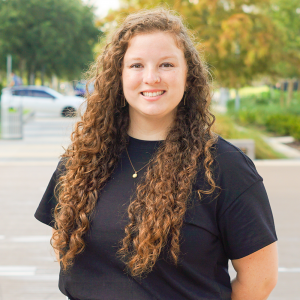Get to know EAP therapist Allison Rider

Allison Rider recently joined the University of Florida as a new Employee Assistance Program, or EAP, therapist. As a Licensed Mental Health Counselor, she has worked with individuals from various backgrounds and has experience dealing with issues such as trauma, anxiety, PTSD, relationship concerns and more.
What inspired you to pursue a career as a therapist?
Even from childhood, I knew I wanted to be in a helping profession. I have always found there to be something so beautiful about connecting with others and meeting a need for them. My sights were set specifically on becoming a therapist when I took a crisis counseling class in undergrad and was reminded of a sobering truth — hurt and pain can happen to anyone at any time, regardless of their background or life circumstances. And when an unexpected situation abruptly interrupts one’s life, it can be a challenge to see where there is room for hope. That is one of my primary goals as a therapist, to bring hope back into the equation.
How would you describe your clinical/therapeutic approach?
While I integrate components from different methods depending on a person’s needs, I typically work from a cognitive behavioral therapy approach. I also utilize person-centered and solution-focused techniques.
What can people expect out of a typical session with you?
I aim to bring into each session an environment of warmth, comfort and empathy. I value being able to build a relationship with each client, as that is a key part of fostering safety and vulnerability in the therapeutic space. In addition to building that rapport, I like to work with clients to identify what practical steps can be adopted into their day-to-day that can help them reach their therapeutic goals, so they can walk away from a session feeling like they got something tangible.
Within your work, what are your areas of interest and why?
Because of previous professional work, one area of interest is trauma and the short- and long-term impacts of such experiences. Everyone has either encountered or will encounter trauma in some capacity in their life, whether it be a first-hand experience or tangentially through a loved one’s experience. Even if you may not ordinarily define the situation as traumatic, trauma in all shapes and sizes can be jarring, and I value helping others gain resources and support to strengthen their resiliency and hopefulness as they walk through that challenging season.
One of your specialties is helping individuals going through a life transition, can you tell us how you approach this type of therapy session?
A life transition can be defined by a wide number of circumstances. It could be something positive and exciting, like starting a new job, exploring a new relationship, etc. It could also be a more stressful change, like adjusting to your “new normal” after the loss of a loved one, coming to terms with an unexpected medical diagnosis, a dream not panning out the way you had anticipated and you’re prompted to change course, etc. All transitions, both the ‘good’ and ‘bad’ ones, require some kind of adjustment, and adjustments can be challenging. When navigating these events in sessions, I like to bring focus to what factors are still in the individual’s control — as a lot of the anxiety in life transitions can stem from feeling so out of control — and to identify what tools can help them manage the stress of the adjustment.
Do you have any self-care tips you could share?
Self-care is so much more than simply living out the motto “treat yo-self” — although I absolutely am an advocate of treating yourself to nice things and experiences! It also includes treating yourself well, that you are intentional about meeting and caring for your physical, mental, emotional and social needs. Our fast-paced society at times leaves us in a position where one or more of these areas is left unattended, and that in turn can leave us feeling unfulfilled or lacking. When I find myself feeling stretched thin or approaching burnout, I like to compassionately evaluate in what ways an area of need isn’t being met, then I try to find a practical way to meet it. This could be taking a walk in the sunshine, talking with a support person, engaging with a favorite hobby, making a nutritious and satisfying meal, revamping my bedtime routine, etc. Anything that is fulfilling an area of need for you is a good choice for self-care.
To schedule an appointment with Allison, visit the UF Employee Assistance Program website. Appointments are available to all faculty, staff, graduate assistants, non-student OPS employees, housestaff/residents and postdoc associates.